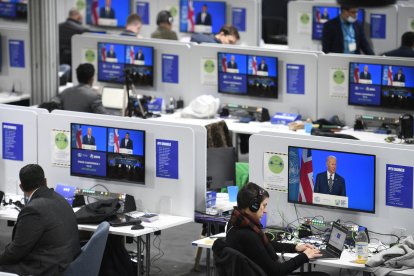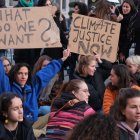Report reveals ‘green’ billionaires are funding the spread of the 'climate emergency' in the media
The Earth Journalism Network (EJN) tells journalists to abandon objectivity and silence those who question the official climate change narrative.

Journalists in the COP26 press room
"In our current global moment, every story is a climate story." So preaches the international Earth Journalism Network (EJN), an environmental organization that acts as a bridge between billionaires and journalists.
A report by researchers at Deakin University in Melbourne, Australia, reveals key facts about the non-profit institution that claims to reach "virtually every region of the world," offering financial support, training and mentoring to thousands of reporters.
According to the EJN’s website, it is supported by international organizations such as the European Commission and the United Nations, national ones like the U.S. State Department and some of the country's most important names, such as Rockefeller and Bloomberg. There is also no shortage of organizations such as the controversial Tides.
“Covering the Planet: Assessing the State of Climate and Environmental Journalism” is a groundbreaking report, according to its authors, because it is the first "truly global" study of environmental and climate change journalism.
After interviewing hundreds of journalists, it offers analysis and possible solutions to coverage. In doing so, it reveals key points about what it seeks from journalists in exchange for green funding. "Every story is a climate story."
A profession in crisis, an opportunity for green money
Journalism facing a funding crisis is an undeniable reality of the profession, and a true one. Since the rise of the internet, advertisers have abandoned newspapers in favor of other digital media, such as social networks, and print circulation has plummeted. This is something that environmental organizations can take advantage of, according to the report.
Journalists who have benefited, however, admit to being concerned about how this external money affects their independence. One reporter from Brazil acknowledged that the funding objectives of environmental organizations influence the choice of which topics to cover: "Why did we have so much coverage about Amazon? Because it was important, but also, because there is funding to do that."
The same journalist points out that a "bubble" of media born thanks to this international funding was created, and they depend on it to keep flowing. In another part of the report, the researchers recommend that donors allow journalists more freedom to decide what topics to cover, because many times NGOs provide funds to cover "a particular subject area, determined by funder interests and goals."
Another example is at the end of the report, when it advises journalists that “‘justice perspectives’ should be highlighted in climate change reporting.”
It also warns: "Responsibility for causing and responding to climate and environmental harms is not equal across the planet. Journalists should address differential responsibility and climate justice perspectives in their climate change reporting."
Activist journalism
The report also calls into question the role of reporters. After acknowledging that environmental journalists are often considered activists by their colleagues, it argues that both the possibility of objectivity and its necessity have been called into question.
In its final recommendations to reporters, the report tells them that they should "consider their own, and their media outlet’s position on the spectrum between ‘objectivity’ and ‘advocacy.’" It also argues that "each journalist should consider their own stance on objectivity in journalism versus advocacy for action." It says that being an activist and being objective are not necessarily "mutually exclusive."
It likewise advises millionaire donors to forget about objectivity: "A requirement not to advocate should not be a condition of funding climate and environmental journalism."
The report not only takes aim at the professional pursuit of objectivity, but also recommends silencing dissenting voices. "Journalists should not provide a platform for sources that deny climate science," it says bluntly.
The study describes as "concerning" that there are reporters who seek to do "balanced" reporting. Some 62% of respondents claimed to have included testimony from sources that are "skeptical" that climate change is caused by humans or "climate science."
"It has famously been shown, for example, that journalistic ‘balance’ can be problematic when reporting on highly polarized issues such as climate change."
While at the end of the report the authors prompt journalists to question objectivity, in the executive summary, they provide them with an answer:
"In our current global moment, every story is a climate story – and every story, singularly and collectively, has the potential to address the threats faced by our shared planetary habitat," the executive summary reads.















